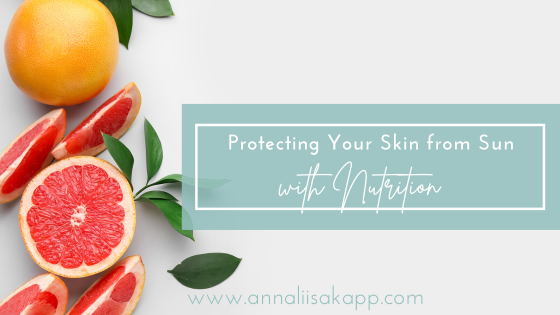
.
Are you a sun baby and love to bathe yourself in the bronzing rays? You are not alone, how could anyone resist basking in the warming sunshine! Remember the ad from our childhood of a bikini clad toddler getting her swimsuit tugged at by an obscenely cute dog? They had something right – the necessity of sunscreen, but with the increase of harmful toxins and harmful ultraviolet (UV) radiation, we need to take the extra step to protect ourselves daily.
.
Although we get the benefit of vitamin D from sun rays, the continuous exposure to UV radiation can also reduce skin and blood antioxidants and cause damage to cell components, including our DNA. This leads to skin disorders like sunburns, photo-damage, hyper pigmentation, premature aging, and non-melanoma skin cancer.
.
But did you know your body has it’s own natural endogenous defense system? In addition to non-toxic topical sunscreen, it is necessary to incorporate nutrients in your diet that help protect your skin internally. Certain nutrients from foods and supplements can act as internal photo protective agents. They help to prevent you from having that ‘leathered’ look..
.
The top nutritional powerhouses to offer internal sun protection and glowing skin are:
Vitamin A (β-carotene) and Lycopene for Sunburn Protection
Several studies show that consumption of β-carotene induced an increase in the reflective properties of the skin and may have a direct photo-protective effect because of its physical ability to absorb light. This means that you can protect your skin from sunburns by consuming foods rich in vitamin A. Pretty sweet, right? Sun protective β-carotene is found in spirulina, kale, and orange fruits and vegetables -like carrots. (study)
Lycopene is another essential antioxidant called carotenoid. Lycopene is important because it helps to protect the skin from sunburns by clearing up the free radical damage caused by sun exposure, as found in this study. Lycopene can be found in apricots, grapefruit, papaya, and tomato paste.
.
Vitamin E and C to Prevent Sun Damage
The combination of vitamin C and E is a powerful way to protect the skin from sun damage. Acting as antioxidants, studies show that these vitamins help to protect the skin from acute sun damage that shows up as erythema. Besides its antioxidative properties, in one study, vitamin E was shown to have an anti-inflammatory effect and thereby complement the photo-protective effects of other antioxidants in the skin. Vitamin E can be found in sunflower seeds, greens (especially spinach, swiss chard, and beet greens) and avocado. The richest sources of vitamin C come from papaya, bell peppers, and broccoli spouts.
.
Chocolate to the Rescue
As always, chocolate comes to save the day. The polyphenol antioxidants in cocoa, called flavanols, have been shown to protect the skin from UV damage. The quality will make the biggest difference, so look for minimally processed dark organic chocolate with 70% or more cocoa or opt for a superfood source that contains 329mg of flavanols with guaranteed potency.
.
Cancer Protection with Green Tea Extract
One of the amazing benefits of green tea is due to the high amount of polyphenols found in it’s leaves. Studies show that these polyphenols help inhibit carcinogenesis caused by UV-radiation and boosting the immune system. These beneficial effects are achieved by drinking green tea daily or by supplementation.
.
Put Out the Fire with PUFA’s
Polyunsaturated fatty acids (PUFAs) have been shown to provide photoprotective effects, particularly eicosapentaenoic acid (EPA). One study found that supplementing with 4 grams of fish oil for 3 months helped prevent sunburn and increased the threshold to sunburn formation due to it’s anti-inflammatory effects. Common food sources of PUFA’s are cod liver oil, fish oil, and marine animals with a high amount of fat, such as mackerel and wild salmon. To ensure you are getting enough anti-inflammatory skin protection, you can use a supplement containing appropriate amounts of EPA.
.
What you eat can either accelerate premature aging and DNA destruction or help to protect you from the harmful effects of pollution and UV rays. Even though supplementation with these nutrients has shown to provide protection against ultraviolet light, it is important to continue to use non-toxic topical sunscreens to prevent damage caused by harmful UV rays.
To help protect your skin from the inside out, check out the list of supplements I have specifically researched and added to my list of top choices for skin health! Here is a link to my Fullscript account that includes a special savings for all my clients and patients.





